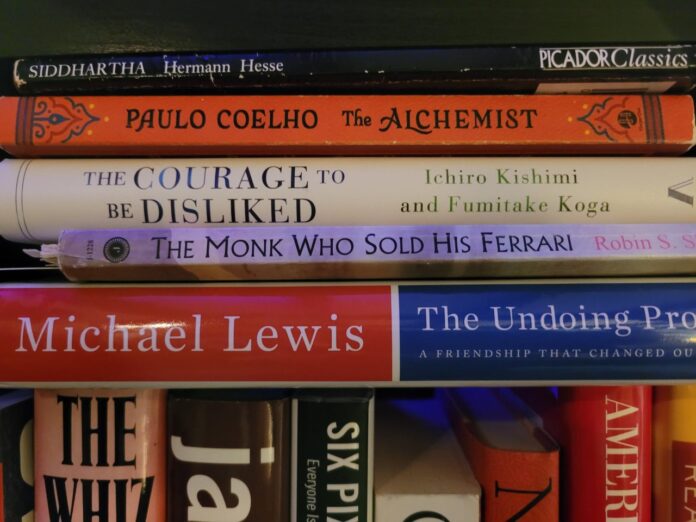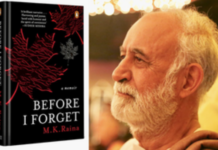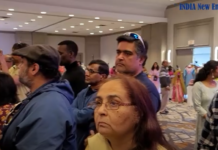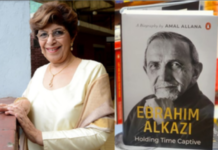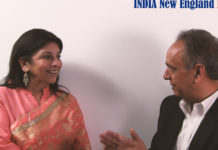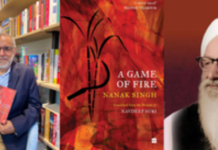By Upendra Mishra
BOSTON—As late springs and early summers in New England force us to take our living and readings outdoors, the long winter nights create cozy and relaxed places inside our homes for readings.
This is the comforting place, where we forget the snow, chilling winds and cold weather outside, and snuggle ourselves in the comforts of books with a glass of wine, beer, chai or coffee in a soft corner of our sofas or in reading chairs in front of a fireplaces.

I always go to some old books that I have read in the past, and some new ones that my bookish friends have recommended or I have found them on my own for each winter. The two new books that I have read or still reading this season are: The Courage to be Disliked by Ichiro Kishimi and Fumitake Koga (Simon & Schuster, 2017); and The Undoing Project: A Friendship that Changed Our Minds by Michael Lewis (W.W. Norton & Company, 2017).
In addition, I went back to my three favorite classics: The Alchemist by Paulo Coelho (HarperCollins, 1988); The Monk Who Sold His Ferrari by Robin Sharma (Jaico Publishing, 2003); and Sidhartha by Herman Hesse (Pan Books Ltd, 1954).
The Courage to be Disliked was a great discovery. Just reading the cover flap of the book got me excited: “Is happiness you choose for yourself? The Courage to be Disliked presents a simple and straightforward answer. Using the theories of Alfred Adler, one of the three giants of nineteenth-century psychology along side Freud and Jung, this book follows an illuminating dialogue between a philosopher and a young man. Over the courses of five conversations, the philosopher helps his student to understand how each of us is able to determine the direction of our own life, free from the shackles of past traumas and the expectations of others.”
Chapters of the books are small and headlines points you in the right direction. Although it is better to read from beginning to the end, you can open this book anywhere and start read. Here are some chapter titles:
- People Fabricate Anger
- Unhappiness is Something You Choose for Yourself
- Your Life is Decided Here and Now
- Feeling of Inferiority Are Subjective Assumptions
- Braggers Have Feeling of Inferiority
- Admitting Fault is Not Defeat.
- Desire for Recognition Makes You Unfree
- Why Am I Only Interested in Myself
- The Courage to Be Normal.
The other new book this season was The Undoing Project by Michael Lewis. A friend had sent this book to me anonymously. The book is about how a Nobel Prize-winning theory of the mind altered our perception of reality, and it is also a story a great friendship. If you think you always make the right decisions, think again, and read this book. I had started reading this book this summer.
The Undoing Project did change my mind in many ways. It made me realize the stark differences between emotional and rational decisions, and how often we make emotional decisions that contain many errors. How we justify our decisions, how we experience happiness with anticipation, when we experience it and when we remember it? How human mind works or fails to work when it is forming judgements and making decisions? Are we smart to know our own mind well enough to mistrust it? Should we look for the right answer or better answer?
What about all the biases that comfortably reside in our mind and make us err many of our decisions? “Human mind was just bad at seeing things it did not expect to see, and a bit too eager to see what it expected to see.” “Maybe the mind’s best trick of all was to lead its owner to a feeling of certainty about inherently uncertain things.”
Here are a few excerpts The Undoing Project:
- “The human mind was just bad at seeing things it did not expect to see, and a bit too eager to see what it expected to see.”
- “Amos was not merely an optimist. He willed himself to be an optimist because he had decided pessimism was stupid. “When you are a pessimist and the bad thing happens, you live it twice,” Amos liked to say. “Once when you worry about it and the second time when it happens.”
- “The big choices we make are practically random. The small choices probably tell us more about who we are. Which field we go into may depend on which high school teacher we happen to meet. Who we marry may depend on who happens to be around at the right time of life. On the other hand, the small decisions are very systematic. That I became a psychologist is probably not very revealing. What kind of psychologist I am may reflect deep traits.”
- “When they made decisions, people did not seek to maximize utility. They sought to minimize regret.”
- “The way the creative process works is that you first say something, and later, sometimes years later, you understand what you said.”
- “It is sometimes easier to make the world a better place than to prove you have made the world a better place.”
- “The world’s not just a stage. It’s a casino, and our lives are games of chance. And when people calculate the odds in any life situation, they are often making judgments about similarity—or (strange new word!) representativeness. You”
One of the old books that I have already mentioned zillion times in the past is The Monk Who Sold His Ferrari by Robin Sharma. It has become one of my favorite books. I keep going back to it. Loved this on nobility and enlightened people.
Here are some exchanges from the Monk Who Sold His Ferrari:
Nobility?
“There is nothing noble about being superior to some other person. True nobility lies in being superior to your former self.”
Enlightened people?
“Truly enlightened people never seek to be like others. Rather, they seek to be superior to their former selves. Don’t race against others. Race against yourself.”
But it is easier said than done. How to do it?
“When you master your mind, you master your life. Mental mastery starts with being able to control every thought that you think.” “When you control your thoughts you control your mind. When you control your mind, you control your life.”
And the surest way to start controlling your thoughts is staying miles away from gossipers and trivial talkers. No matter how harmless you think gossips and trivial talks are, they will sow the seed of poison in your mind and you will never be able to take charge of your thoughts.
I read “The Alchemist” a novel by Paulo Coelho for the third time. Well, I am not a novel reader—unless it is extraordinary and has been highly recommended by my bookish friends. I highly recommend it to my bookish friends who have not read it. A few excerpts from The Alchemist:
- “Don’t be impatient.”
- “Why do we have to listen to our hearts?” the boy asked. “Because, wherever your heart is, that is where you will find your treasure.”
- “The simple things are also the most extraordinary things, and only the wise can see them.”
- “If he pushed forward impulsively, he would fail to see the signs and omens left by God along his path.”
- “People become fascinated with pictures and words, and wind up forgetting the Language of the World.”
- “When you want something, all the universe conspires in helping you to achieve it.”
- “One is loved because one is loved. No reason is needed for loving.”
- “There is only one thing that makes a dream impossible to achieve: the fear of failure.”
- “The secret of life, though, is to fall seven times and to get up eight times.”
- “Everyone seems to have a clear idea of how other people should lead their lives, but none about his or her own.”
- “Everything that happens once can never happen again. But everything that happens twice will surely happen a third time.”
The first time I learned about Siddhartha was in 1978 when I was a student at the Allahabad University. The movie Siddhartha was playing in a local theater. The problem was that it was in English language, and I had just started to learn to listen and speaking English. I watched the movie and loved it (although I did not understand many things because of language barrier.)
Many years later, I bought the book and read it. The book was quite different from the movie. Then I forgot about the book and the movie, Later, this book became a required reading from son in High School, and we had an interesting discussion about the book.
Recently, when I was discussing The Alchemist with a friend as I was reading it, he mentioned Siddhatha and I immediately grabbed it from my book shelf and started reading. With all these years of experience and life lessons, I thought I was reading a brand new book. Only 119 pages and I was able to finish in quickly and spent a lot of time of thinking about the wisdom from that book.
See how profound is this:
“Wisdom cannot be imparted. Wisdom that a wise man attempts to impart always sounds like foolishness to someone else … Knowledge can be communicated, but not wisdom. One can find it, live it, do wonders through it, but one cannot communicate and teach it.”
“I have had to experience so much stupidity, so many vices, so much error, so much nausea, disillusionment and sorrow, just in order to become a child again and begin anew. I had to experience despair, I had to sink to the greatest mental depths, to thoughts of suicide, in order to experience grace.”
“So she thoroughly taught him that one cannot take pleasure without giving pleasure, and that every gesture, every caress, every touch, every glance, every last bit of the body has its secret, which brings happiness to the person who knows how to wake it. She taught him that after a celebration of love the lovers should not part without admiring each other, without being conquered or having conquered, so that neither is bleak or glutted or has the bad feeling of being used or misused.”
“And here is a doctrine at which you will laugh. It seems to me, Govinda, that love is the most important thing in the world.”
(Mr. Mishra is managing partner of the Waltham, MA-based integrated inbound marketing and PR firm The Mishra Group. He writes about his three passions: marketing, scriptures and gardening.)



